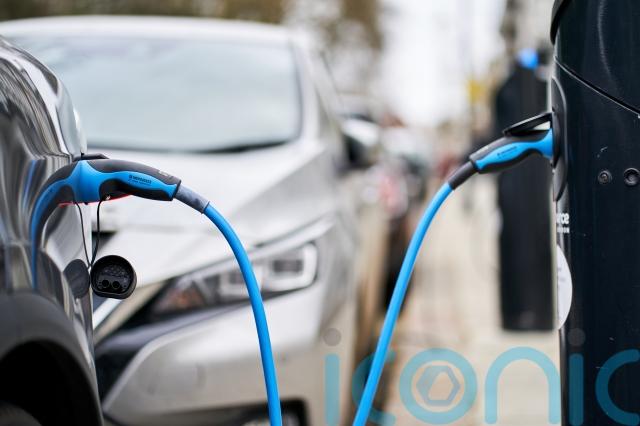
Government grants for electric vehicles (EVs) may be a “waste of money” because they do not appear to be encouraging more drivers to switch from petrol or diesel models, according to new analysis.
The new EV market share of models eligible for the grant in September – the scheme’s first full month – was unchanged from between April and June at 23.8%, the report from green transport research organisation New Automotive said.
This shows it is unclear the discounts are “prompting consumers to consider buying cars that they wouldn’t have bought anyway”, the report’s author warned.
One EV expert said the Department for Transport’s (DfT) initiative “hasn’t lived up to the hype”.
But the department described the analysis as “incorrect”, and said more than 20,000 people have received the grants.
Under the scheme, drivers can receive a discount on the purchase of certain EVs costing up to £37,000.
The grants are worth £1,500 for 34 models and £3,750 for two models, with the amounts determined using sustainability criteria.
New Automotive’s report considered whether the scheme is “a waste of money”.
It said: “It is early days, but there is little evidence as yet that consumers are responding to the change by buying eligible cars in any greater numbers than they are buying non-eligible cars.
“It could be argued then that consumers (if the grant is passed on in lower prices), or manufacturers (if it is not) are being rewarded at the public expense to do something they would have done anyway.
“That would make it a poor use of public funds.”
But the report also noted that some manufacturers not producing cars eligible for the grant have responded by cutting their own prices, leading researchers to state there is a possibility that ministers are “geniuses of policy design”.
The report claimed there are “more important things” that the Government should be doing to boost the take-up of EVs.
Potential suggested measures include increasing the number of people who can charge at home by giving new rights to tenants and leaseholders to install chargers, and forcing local authorities to accept cross-pavement charging outside properties.

Report author David Farrar told the PA news agency: “The electric car grant has sent a strong signal of Government commitment to EVs, supporting consumer confidence, the expanding used market and green jobs in markets closer to home.
“But it isn’t yet clear that it’s prompting consumers to consider buying cars that they wouldn’t have bought anyway.”
Ginny Buckley, chief executive of EV advice website Electrifying.com, said: “Labour’s electric car grant hasn’t lived up to the hype.
“That money would have been far better spent boosting the used EV market with interest-free loans – like the one in place in Scotland – or helping lower-income buyers install home chargers.
“These are initiatives that would deliver real impact, rather than headlines.”
Pat Hoy, founder of car price analysis company Insider Car Deals, said: “The £1,500 on offer just nudged prices closer to where they need to be, yet some dealers rowed backs on discounts.
“The result is a scheme that’s poorly designed, badly executed and doing little more than papering over cracks.”
A DfT spokesperson said: “This reporting is incorrect – August was the first month when discounts were available under the electric car grant, and sales were up 24%.
“Over 20,000 people have already used the grant which has made it cheaper than ever to buy an EV.
“With 36 EVs qualifying for the discounts so far – and interest in some models up 540% since launch – combined with competition driving costs down across the market, a record number of families are making the switch.”
The first discounts were available from August 5.
The DfT added that industry data shows upfront costs of new EVs have fallen by 14% since last year.
Subscribe or register today to discover more from DonegalLive.ie
Buy the e-paper of the Donegal Democrat, Donegal People's Press, Donegal Post and Inish Times here for instant access to Donegal's premier news titles.
Keep up with the latest news from Donegal with our daily newsletter featuring the most important stories of the day delivered to your inbox every evening at 5pm.